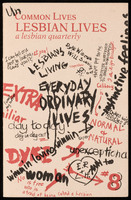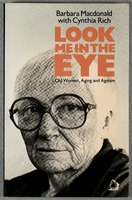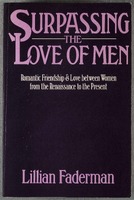Items
Theme is exactly
Lesbian Relationships
-
 Common lives/lesbian lives : a lesbian feminist quarterly. Number eight, Summer 1983 Founded in 1981 and edited, typeset, printed and bound by a lesbian collective from Iowa City, ‘Common Lives/Lesbian Lives’ was a quarterly journal committed to “describing the lives of ordinary lesbians” in all their diversity. As the front matter states, this included “lesbians of color, Jewish lesbians, fat lesbians, lesbians over fifty and under twenty years old, physically challenged lesbians, poor and working-class lesbians and lesbians of varying cultural backgrounds”. This issue features poetry, childhood memoir from Joan Nestle and a piece showcasing visual art, with black-and-white reproductions. It is also notable for the essay ‘Love as Addiction – A Story of Battering’ by Kate Hurley, one of the first explorations of intimate partner violence among same-gender couples. ‘Common Lives/Lesbian Lives’ ran for a total of 56 issues, until its primary distributor went bankrupt in 1995.
Common lives/lesbian lives : a lesbian feminist quarterly. Number eight, Summer 1983 Founded in 1981 and edited, typeset, printed and bound by a lesbian collective from Iowa City, ‘Common Lives/Lesbian Lives’ was a quarterly journal committed to “describing the lives of ordinary lesbians” in all their diversity. As the front matter states, this included “lesbians of color, Jewish lesbians, fat lesbians, lesbians over fifty and under twenty years old, physically challenged lesbians, poor and working-class lesbians and lesbians of varying cultural backgrounds”. This issue features poetry, childhood memoir from Joan Nestle and a piece showcasing visual art, with black-and-white reproductions. It is also notable for the essay ‘Love as Addiction – A Story of Battering’ by Kate Hurley, one of the first explorations of intimate partner violence among same-gender couples. ‘Common Lives/Lesbian Lives’ ran for a total of 56 issues, until its primary distributor went bankrupt in 1995. -
 Look me in the eye : old women, aging, and ageism This book focusses on women and ageing via several essays previously published in journals such as ‘Broomstick’ and ‘Sinister Wisdom’. Barbara Macdonald (1913-2000) and Cynthia Rich (1933-), the sister of poet Adrienne Rich, who were a couple and active in the women’s rights movement, write from different stages in the ageing process. Macdonald uses her introduction to reflect on the repressive environment she encountered growing up, which forced lesbians to become “other”, an otherness she now equates with being an older woman. The copy displayed here is the 1985 reprint edition. The first edition, and likely the one seized during the raids, was published by Spinsters Ink, a feminist press founded in 1979 in New York by Judith McDaniel and Maureen Brady.
Look me in the eye : old women, aging, and ageism This book focusses on women and ageing via several essays previously published in journals such as ‘Broomstick’ and ‘Sinister Wisdom’. Barbara Macdonald (1913-2000) and Cynthia Rich (1933-), the sister of poet Adrienne Rich, who were a couple and active in the women’s rights movement, write from different stages in the ageing process. Macdonald uses her introduction to reflect on the repressive environment she encountered growing up, which forced lesbians to become “other”, an otherness she now equates with being an older woman. The copy displayed here is the 1985 reprint edition. The first edition, and likely the one seized during the raids, was published by Spinsters Ink, a feminist press founded in 1979 in New York by Judith McDaniel and Maureen Brady. -
 Surpassing the love of men : romantic friendship and love between women from the Renaissance to the present Academic Lillian Faderman (1940-) uses literary and documentary sources to present a history of romantic love between women, one of the first comprehensive studies of its kind. Following initial research on poet Emily Dickinson’s love letters to her sister-in-law Susan Gilbert, Faderman expanded her scope to consider a period of five hundred years and the lives of many women (including those featured in the ‘Scotch Verdict’ case explored in another Faderman work seized during the raids). The book describes how societal attitudes to love between women moved from tolerance (albeit not to women who dressed as men), to prejudice and eventually, to liberatory lesbian feminism. The book, dedicated to Faderman’s partner Phyllis Irwin, is shown here in the UK edition, although it is likely to have been the US William Morrow edition that was seized from Gay’s The Word.
Surpassing the love of men : romantic friendship and love between women from the Renaissance to the present Academic Lillian Faderman (1940-) uses literary and documentary sources to present a history of romantic love between women, one of the first comprehensive studies of its kind. Following initial research on poet Emily Dickinson’s love letters to her sister-in-law Susan Gilbert, Faderman expanded her scope to consider a period of five hundred years and the lives of many women (including those featured in the ‘Scotch Verdict’ case explored in another Faderman work seized during the raids). The book describes how societal attitudes to love between women moved from tolerance (albeit not to women who dressed as men), to prejudice and eventually, to liberatory lesbian feminism. The book, dedicated to Faderman’s partner Phyllis Irwin, is shown here in the UK edition, although it is likely to have been the US William Morrow edition that was seized from Gay’s The Word.
